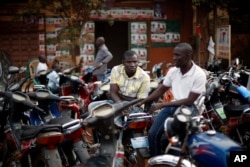The West African nation of Mali has undergone an extraordinary transformation since 2012. Events have included a military coup, a foreign military operation to battle Islamist insurgents in the north and a presidential election; but, many young people in Mali who have lived through the turmoil are now asking, “What about us?”
Recent demonstrations in northern cities like Gao and Timbuktu reveal that a 2015 peace agreement designed to end conflict in Mali has left the youth feeling left out of the promised benefits of peace.
In Gao, young people held signs with the slogan “trop c’est trop” or “enough is enough,” which has become the rallying cry of the movement. In July, security forces opened fire on protesters, killing three and wounding more than 30.
Another set of protests followed when popular radio personality Mohamed Youssouf Bathily, commonly known by the alias Ras Bath, was arrested for condemning corruption in the government.
Abdoulaye Coulibaly Fama, a resident of Bamako who participated in demonstrations, said these events reveal the deep dissatisfaction of the youth in Mali.
“There are many incidents lately which are a sign of a widespread malaise that characterizes the Malian population,” he said. “He [Bath] should not have been arrested in the first place. His release…shows a weak government - a government which cannot take responsibility - a government Malian people cannot trust.”
Similarly, a young man in Gao told VOA Afrique that the promise of the presidency of Ibrahim Boubacar Keïta, elected in 2013, has not been realized. He pointed to the fact that the city of Kidal, a flashpoint of the 2012 rebellion, is still not under government control.
“The state does not want to take responsibility. I really think these three years have been wasted,” he said.
Sidelined by peace agreement
Observers think that even though events like the arrest of the media personality triggered demonstrations, the core issues are linked to governance and dissatisfaction with the peace agreement.
Kamissa Camara, a West and Central Africa political analyst and the senior program officer for Africa at the National Endowment for Democracy, said that youth in the north believe they played a critical role during the crisis of 2012, but were all but forgotten during the peace process.
“They were protecting communities from the rebels, from the jihadists,” she said. “And because they played such a huge role in stabilizing northern Mali, when the government of Mali signed a peace agreement with the rebels, the youth thought or felt that they were being put aside; they were sidelined by the agreement when they should have also been part of the peace benefits.”
Many young people were particularly incensed that an internationally-funded process for disarmament and reintegration is offering former rebels incentives like job training and stipends in order to lay down arms; but, non-combatants are largely left out of this process.
The youth are further upset that former rebels are now being named to leadership roles in Gao.
“The rebels, the people who picked up the arms and raped women in northern Mali defeated the Malian army - killed Malian soldiers - are the ones being rewarded when they, the youth, played a positive role in stabilizing northern Mali and didn’t get the result and didn’t get rewarded for that,” Camara said.
The years of violence have shattered an already fragile economy in the north, making employment opportunities rare. Although the World Bank says youth employment in Mali is only 10.5 percent, the number is much higher in the north and dissatisfaction is growing.
“What the youth are looking for is to be reintegrated into the civil service, for example, and to actually get jobs the same way these rebels are being rewarded right now,” Camara said.
Threat of extremism is real
As disaffected young people take to the streets, militant groups are offering a paycheck and a sense of camaraderie. Extremist groups including the al-Qaida-affiliated Ansar Dine and the Movement for Unity and Jihad in West Africa (MUJAO) have continually launched attacks in the north since 2012.
Lori-Anne Théroux-Bénoni is a senior researcher with the Institute for Security Studies (ISS) based in Dakar, Senegal. She was part of a research team from ISS that collected testimony from 63 young people who have been involved with Malian extremist groups, including 19, who are in jail.
The report, titled “Mali’s Young Jihadists,” is challenging preconceptions of the reasons why young people join extremist and jihadist armed groups.
The researchers identified 15 factors that lead to youth involvement. Some of the factors are psychological, historical or political, while some are linked to coercion or the environment. She said contrary to popular conception, many don’t join primarily for religious reasons or money.
Théroux-Bénoni said that there needs to be a more complex understanding of these reasons that underlie youth involvement instead of the labeling all of militants as unemployed and fanatical.
“For some of the youth that we spoke with, the reason for joining was to protect cattle in the region of Mopti; for other young people it was really the fact that the groups were actually providing security and rule of law,” she said. “I think one of the important findings is that the joining is not something that is based on will. There are a lot of cases of forced recruitment or coercion, examples of imams in mosques who were visited by armed men who requested their support to organize specific meetings and who were then given money.”
The report found that there is certainly a link between unemployment and extremism, but that link is not always so clear. Sometimes it’s not there at all. One former extremist told researchers he joined so he could afford to get married. Another said he did so to fight back against Tuaregs who were plundering the area. A third said he was convinced by jihadist propaganda videos.
“It’s important not to think of the factors as factors that work on their own. Most of the factors actually interact with each other,” she said.
Kassim Traoré and Boubacar Toure contributed to this report





